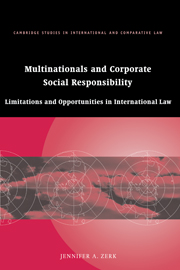 Multinationals and Corporate Social Responsibility
Multinationals and Corporate Social Responsibility Published online by Cambridge University Press: 23 July 2009
International law constraints on the jurisdiction of states have always posed difficulties for the regulation of multinationals. As discussed in chapter 2, international law is concerned fundamentally with relations between states. Multinationals are not traditional subjects of international law, and the extent to which international law now imposes obligations directly upon them is still controversial. This focus on states as the primary subjects of international law has led more than one commentator to doubt whether international law, as presently constructed, is properly equipped to deal with the challenges posed by international business. As multinationals span national boundaries, no one state has rights and obligations in respect of them. For these reasons, multinationals are often said to ‘fall through the cracks’ of the international regulatory system.
The aim of this chapter is to examine in more detail the concept of jurisdiction, as it applies to the social and environmental regulation of multinationals. As will be seen, different branches of law approach jurisdictional problems differently depending on whether the law is called upon to enforce public law or private law rights and obligations. Both are dominated by notions of ‘territoriality’. However, public international law (generally referred to in this book simply as ‘international law’), which governs the geographical scope of state power, tends to view jurisdiction in spatial terms, whereas in private international law jurisdiction is generally justified in terms of ‘connecting factors’ between the particular dispute and the ‘forum state’.
To save this book to your Kindle, first ensure [email protected] is added to your Approved Personal Document E-mail List under your Personal Document Settings on the Manage Your Content and Devices page of your Amazon account. Then enter the ‘name’ part of your Kindle email address below. Find out more about saving to your Kindle.
Note you can select to save to either the @free.kindle.com or @kindle.com variations. ‘@free.kindle.com’ emails are free but can only be saved to your device when it is connected to wi-fi. ‘@kindle.com’ emails can be delivered even when you are not connected to wi-fi, but note that service fees apply.
Find out more about the Kindle Personal Document Service.
To save content items to your account, please confirm that you agree to abide by our usage policies. If this is the first time you use this feature, you will be asked to authorise Cambridge Core to connect with your account. Find out more about saving content to Dropbox.
To save content items to your account, please confirm that you agree to abide by our usage policies. If this is the first time you use this feature, you will be asked to authorise Cambridge Core to connect with your account. Find out more about saving content to Google Drive.